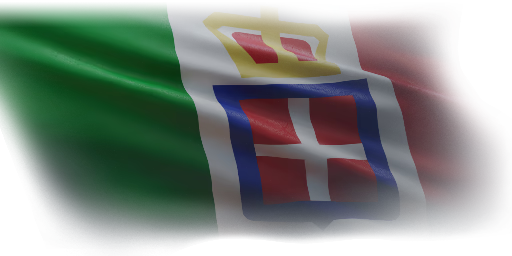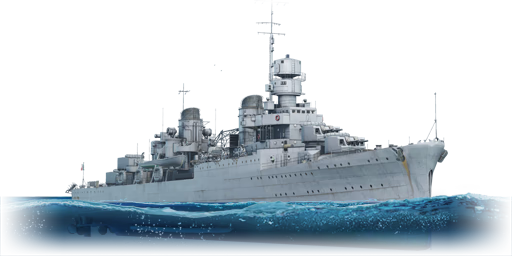




The RN Attilio Regolo was a light cruiser of the Capitani Romani class, laid down on September 28, 1939, and completed and commissioned on May 14, 1942. Attilio Regolo had no opportunity to participate in actual wartime missions, on November 7, 1942 she was hit by a torpedo launched from the submarine HMS Unruffled, whose torpedo striking destroyed almost the entire bow, and she only returned to activity on September 8, 1943 in Genoa. According to armistice provisions, on September 9 she arrived at the height of the Gulf of Asinara, and was sent to assist the shipwrecked battleship Roma. Attilio Regolo carried out a total of 3 missions covering 1,962 miles for 113 hours of motion during Co-Belligerent service. After the war, she was transferred to La Spezia where she remained inactive pending the execution of the naval clauses of the Peace Treaty. She was decommissioned on July 26, 1948 and ceded to France, renamed Chateaurenault, and remained in service until October 1, 1962.
The RN Attilio Regolo, introduced with the initial Italian naval tree in Update "Starfighters", is a cruiser with good firepower, mobility, and manoeuvrability characteristics. Its 135 mm guns are perfect for battering destroyers and light cruisers, however, for more armoured targets it has a much harder time causing serious damage. The anti-aircraft armament gives you good cover from air attacks, and its manoeuvrability and speed allow it to dodge enemy shells and torpedoes. However, its survivability is not the best, as it is very lightly armoured.
| Ammunition | Type | Armor penetration (mm) at a distance: | |||||
|---|---|---|---|---|---|---|---|
| 10 m | 100 m | 500 m | 1000 m | 1500 m | 2000 m | ||
| HE | 23 | 23 | 23 | 23 | 23 | 23 | |
| APHEBC | 173 | 148 | 122 | 105 | 94 | 81 | |
| HE-TF | 23 | 23 | 23 | 23 | 23 | 23 | |
| Belt | Belt filling | Armor penetration (mm) at a distance: | |||||
|---|---|---|---|---|---|---|---|
| 10 m | 100 m | 500 m | 1000 m | 1500 m | 2000 m | ||
| HEF-T | 5 | 5 | 5 | 5 | 5 | 5 | |
| Belt | Belt filling | Armor penetration (mm) at a distance: | |||||
|---|---|---|---|---|---|---|---|
| 10 m | 100 m | 500 m | 1000 m | 1500 m | 2000 m | ||
| SAP-I | 29 | 27 | 22 | 18 | 16 | 14 | |
40 × Bollo P.200/1936 moored contact mine











Seakeeping |
|---|
Unsinkability | |
|---|---|
Firepower | ||
|---|---|---|